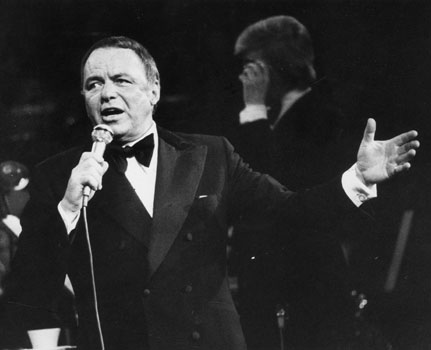Music Isn't Dead, We're Just Old
January 20, 2011 by Somebody Else
You hear the lament all the time, and read about it on YouTube comments following videos of favorite old songs. The same old line time and time again, which goes more or less like this: "You know what, man? This old song is the real deal. The stuff that they come out with these days, it's nothing but total crap. They don't make music like this anymore. There's nothing but a wasteland out there these days."
We have all got tired of waiting around for the next Beatles, and most of us have given up hope. Back in the 1990s, we had heard that it might be the British group Oasis. The music industry geared up to have us believe this, but there was too much hype, too much overblown expectation. Oasis turned out to be not such a bad group and produced a few memorable tunes, but in the end we found out that they were actually not such a big deal after all. It was a letdown. The big vibe just wasn't there.
Maybe we have forgotten why The Beatles were such a massively major social and cultural event. Let's not forget that Frank Sinatra's rat pack, including Dean Martin and Sammy Davis, Jr., were widely considered the top of American pop music culture around the time the Beatles were discovered in the United States. What a contrast.
Sleazy, conformist, conventional, well-connected, mob-controlled, insufferably smug, self-satisfied, often drunk, and embarrassingly corny, Frank and his pals, though talented artists and cultural icons, represented a dead end for pop music. Sinatra and his buddies had a cadre of classically trained musicians backing them up, had all of their tunes composed and arranged by seasoned professionals, had everything produced and packaged and polished to a fine sheen and adorned with a bright red ribbon bow. You looked at Frank Sinatra, and you thought, gee, he's an everyday guy just like me. Maybe I could sing like that. Now, if only I could get mob connections and two hundred tuxedoed musicians playing their hearts out while I sing. We all knew in our heart of hearts that it wasn't going to happen. Frank was up there with the big boys, and all we could do was to admire the glimmer of his stardom shining down from high up above.

Sinatra: dethroned by British invaders
Then, the Beatles came, and everything changed. They had the same kind of everyman appeal as Frank Sinatra, but with a number of important key differences. For one, they were obviously not mobster insiders. They were not corny. They were not conformist. They were not smug and self-satisfied, but instead cocky and irreverent. At the beginning at least, they didn't go for orchestral scores, but instead focused more on voices, drums, two electric guitars, and a bass guitar. They were a stripped-down outfit, and they were writing their own stuff. Maybe most importantly, unlike Frank Sinatra, they were very young, so young people everywhere felt inspired.
It almost seemed that the Beatles were your buddies living down the street who had a little extra spark of talent and inspiration that they somehow ingeniously found a way to share with the rest of the world. They were in the right place at the right time doing the right thing, and they took off. They were the anti-Frank Sinatra of their generation, and that was really something at the time.
Culturally, the world was ready for a change, and the Beatles served as a major catalyst for that change. Thousands upon thousands of aspiring musicians everywhere embraced the standard everyman format of guitars, bass, and drums, started singing, and hoped that they could figure out something similar to what clicked for the Beatles. It seemed within reach. It was like the California Gold Rush of the 1800s. There were some initial spectacular successes, but then afterwards for a long time there were mostly swarms of pathetic souls scratching at ground that had given up every last fleck of its gold years before. Similarly, for decades after the Beatles, group after group has taken its shot at spawning the next wave of Beatle-mania, all to no avail.
Since the Beatles really had no cultural precedent, and since their arrival on the scene also marked rock-and-roll's mass-appeal breakthrough as a musical genre, there can never be anything like them to ever happen again. In the 1960s, popular music, to a significant extent led by the Beatles, functioned as a kind of cultural revelation of sorts. In other words, the music of the Beatles inspired and was in turn inspired by a young, dynamic, and ground-breaking generation. They were exciting times for exploring uncharted artistic waters. For a number of years in the 1960s, artistically speaking, there was a prevalent sense of anything goes and anything might be given a shot.
Unfortunately, this often ended up degenerating into incomprehensible, pretentious avant-garde preposterousness without any real artistic value, evidenced in songs such as the Beatles' own "Revolution Number Nine."
In other instances, rock headed down the road of orchestral virtuosity and almost baroque complexity, such as happened with the progressive rock movement of the early 1970s, and was apparent in the muscular musicality of groups like Yes and Emerson, Lake, and Palmer. Understandably, people eventually got tired of all that, and there was a backlash against it, perhaps most fittingly epitomized by the laser-focused minimalism of groups like the Ramones in the 1970s and by much of the punk rock movement in general.
Actually, if we take a broad look at pop music and rock-and-roll since the 1950s, we see that the driving force has always been novelty and innovation. After a time, everything gets old, so the big challenge has always been to find the next new thing. We've gone from sock-hop rock, to folk music, to British pop, to psychedelic rock, to avant-garde pop music experimentation, to progressive rock, to heavy metal riffs, to punk rock, to funk, to new wave, to grunge rock, to rap, to hip-hop, to reggae, etc. There can be no end to it. The human ear craves something fresh and different, even if such novelty means revisiting old favorite styles in a stimulating new way.
This drive for newness is an essential characteristic of the relationship between music and the new generation that listens to it. This is because, generally speaking, a new generation wants a new style of music to define itself by.
Looking again at the Beatles phenomenon of the 1960s, we see that at that time, the cultural torch was passed from the mothers and fathers who survived World War II to their sons and daughters who were born right before, during, or shortly after that great conflict. The Beatles were young and their listeners were young. So, in the 1960s, pop music turned into a grand, roaring celebration of the novelty of youth.
Counterculture slogans emerged that championed youth and condemned the older generation, such as: "Never trust anyone over thirty." It's kind of funny to realize now that a twenty-year-old in 1968 who might have expressed such a sentiment is now sixty-two years old in 2010. Not only is he now over thirty, he's twice thirty and then some.
Actually, the 1960s youth were in reality sowing the seeds for their own obsolescence by championing youth culture, since during the 1970s they all, well, got older. Who could have seen that coming?
Curiously, even after the youth generation of the 1960s got older, the youth standard for pop music persistently endured. The Beatles perhaps unintentionally conditioned us to view pop music as the exclusive domain of youth in their late teens and twenties. This perspective has been reinforced by the glorification of music produced in the 1960s when the most successful groups of that era were in their twenties. The unspoken message for pop musicians for the last several decades has been that if you don't make it in your twenties as a musician, you aren't going to make it, period. Additionally, if you do make it in your twenties, you should expect to do your best work during that time in your life. You might come up with some hits after the age of thirty, but your mature work will never be as strong as your earlier work. And with regard to live performances, Jefferson Airplane singer Grace Slick famously quipped after she had given up doing shows in public: "I don't like old people on a rock and roll stage, me included."
After all, wasn't rock-and-roll supposed to be about youthful energy, enthusiasm, and rebellion? So, who wants to watch old people playing it?
However, plenty of people are willing to shell out tons of money to see elderly folks like Led Zeppelin, Kiss, and the Rolling Stones play those old songs one more time.
But in a way, that really doesn't count. Let's be honest here. We pay them to play the hit songs they came up with during their salad days, when they were all in their twenties. We are out in the audience, watching our elderly idols, and trying to use our imagination, trying to fantasize that several decades haven't gone by, that they are still somehow as youthful, still somehow as full of the spunk and vigor and white-hot appeal that used to characterize them. It's a losing charade that gets harder and harder to maintain with the passing of every year. In a moment of brutal honesty, Mick Jagger recently said: "We used to be young, good-looking, and stupid. Now we're just stupid."
And without realizing it, the most unfortunate transformation has taken place right under our noses, very gradually, almost imperceptibly. Some of our pop idols of yesteryear have become the Frank Sinatra types of today. Perhaps unintentionally, maybe in spite of their best efforts to avoid it, some of them have become smug, insulated, well-protected, well-connected, and entirely predictable.


Sir Paul and Sir Mick
Despite our deeply nostalgic attachment to our memories of 1960s superstars in the prime of their youth, those of us who have left our twenties behind are understandably going to have less interest in or sympathy for the latest twenty-something musicians to hit the scene. For example, let's say you are in your forties. What are your most important concerns? Well, quite probably, they will be your mortgage or other pressing bills, your career, world news and events, certain philosophical and religious matters, possibly your long-term relationship, possibly your kids, your steadily declining health, and a persistently expanding waistline. Under those circumstances, how much of a connection are you going to feel with a brand new twenty-something rock star who is singing to you about hooking up with some girl at a nightclub, rocking out all night long, playing it loud, being a rebel, ticking off his parents, getting wasted, etc.?
Even assuming that the twenty-something musician in question is reasonably mature and has some intellectually stimulating lyrics to offer, your forty-something mind is probably going to instinctively recoil at the idea of getting into the music of this younger person. Something inside of you is going to say, one way or another: "What does he know? When I was his age, he was wearing diapers, for crying out loud." More than anything else, that creates a deep-rooted prejudice against new pop music that is hard for older generations to overcome. And if you have studied demographics in the United States, you know that we are now a significantly older nation than we were in the 1960s. Median age in America is now 35 years, as compared to 1960, when it was 29 years.
Besides generational differences, another factor that works against new pop music these days is the general collapse of traditional corporate-based pop musician superstardom. And as we all know, the main culprit in this collapse is the Internet.
First, we had vinyl albums that you picked up at record stores. Then, we had CDs that you could also pick up at those same record stores. Everything was still okay for the corporate-backed pop music mega-superstar. Then, the Internet appeared, which allowed music fans to buy their CDs online. That took a big chunk out of the local record store's business, but not yet a fatal one.
No, the death blow to most record stores, as well as to the aspirations of many would-be pop superstars, came with Napster, which offered all of your favorite tunes on the Internet for free. Even though this terrible challenge was eventually beaten back with a concerted corporate attack through the courts, when the dust had cleared, the damage had been done. The masses had become accustomed to downloading their music for free directly off the Internet and storing that downloaded music on their iPods. The pop music industry saw its profits go up in smoke overnight, and most local record stores closed their doors.
Nevertheless, pop superstars still exist to this day, but the dynamics have been drastically changed. Today, the pop superstar must be visually as well as musically appealing. People generally want them to wear flashy clothes, dance provocatively, and be as slick as possible.
Lady Gaga seems to have understood the new cultural dynamic better than most, which is why lately she has emerged as the biggest pop music megastar for these times. Her showmanship and appeal as a live performer is absolutely necessary in today's pop music world, since she isn't going to make as much money from CD sales or from selling her tunes over the Internet. No, her big bucks are going to come from her carefully coordinated shows and meticulously produced music videos.
Gone are the days when the pop star's bread and butter were record sales. Gone are the days when a band could, like the Beatles, get big enough to stop performing live and focus exclusively upon recording music. If downloading music off the Internet had been widely available in 1966, I strongly suspect that the Beatles would not have given up on performing live that year.
So, considering all of these changes, is music today dead? No, it is not, but a lot of us are older, and we are still hung up on the idea that the supposedly best musicians, who are our age, and who play the retro style of music that we like the best, should be the biggest corporate-backed stars, and that we should be able to walk down to a local record store and buy their latest vinyl album, I mean, CD. However, our local record store went belly-up after Napster appeared on the Internet.
No, music is not dead, but we are old. We are no longer in our twenties, and as a matter of instinctive principle, we don't plan to shell out our hard-earned cash for the CD by the latest twenty-something pop star who has captured the public's attention. We have already preemptively decided that such a pop star stinks even before bothering to listen to his music.
No, music is not dead, but our traditional ideas about pop music superstardom are. These days, there is less room at the top than ever, but the upside is that there is a lot more room in the middle. Great original pop music is most definitely out there, and more people than ever before can make some money off of playing it.
Put another way, there are a lot more mini stars out there, that is, people who play live music regionally or just locally, sell a reasonable amount of their CDs and music files over the Internet, enjoy what they do, and get to live like most everyday people do, without being mobbed by autograph seekers when they go shopping for groceries.
The cottage music industry is thriving. Small-scale independent record labels have popped up everywhere, and plenty of musicians without a record label are making decent quality digital recordings in their own inexpensive home studios, and are then making these recordings available over the Internet. Compared to yesteryear, we are up to our ears in music. And much of that music is really worth listening to, especially considering that a lot of people who are making it are doing so for the love of the music itself, since they fully understand that their odds of making obscene amounts of money off it are not very good.
The downside to this new dynamic is that we no longer have the easy comfort of picking a respected major corporate record label and then assuming that their latest contracted musician is going to be worth listening to. No, the way things are today, we've got to get out there and make some effort to find the next musician who makes the hairs on our arms stand on end. And guess what? That musician might be in his forties or fifties, and might perform at a local nightclub in the town where we live! There's nothing wrong with that, is there?
It may seem odd, but in a way, we might be returning to the musical paradigm of the middle ages. At that time, all music was local. Being a musician was just another working man's trade, like being a tailor, a baker, or a smith. If you came up with some good tunes, you could expect to make a decent but not extravagant living from playing them, and you could expect them to be picked up by other musicians and played in other villages and towns. No thought to copyright violations in those days.
Well, we're a bit more sensitive about copyright issues in the present, but perhaps counter-intuitively, music has indeed become more locally and regionally based in the Internet music era, while at the same time becoming much more accessible to an international audience. Ultimately, I think that this is a very good thing, because now there is more out there of just about everything for just about everyone, and musicians as a whole have become less like hapless gold rush hordes and more like medieval troubadours. Overall, there is more love of creating and performing music for its own sake, and less pretentious posturing and posing for the sake of grabbing some corporate golden ring.
Of course, if you are still dejectedly looking over the latest releases by your erstwhile favorite major corporate record label, you might not have noticed.
Do you have strong opinions about the past, present, or future of music? Send your music essay of at least 1000 words to somebody@somebodyswebpage.com with "Is Music Dead?" in the subject line.
Copyright 2011 by Somebody's Webpage







